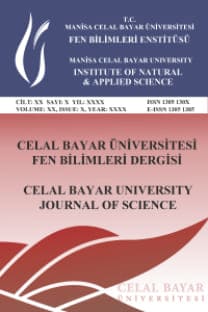Strength Properties of Coated Paper with Cuminum cyminum L. and Prunus mahaleb L.
Coating of the paper surface against to microorganism to making it suitable for food packaging is crucial in terms of improving antimicrobial properties. Cuminum cyminum L. known as cumin and Prunus mahaleb L. have the abundant chemical compound. Cumin has antiviral activity that making it proper for coating due to its various components. Mahaleb as well has rich fragrance make it eligible for sugary snacks and chocolate package. After coating with such biomaterials, thanks to varied fatty acids impart protective feature from oxidation to paper surface. It was observed that the odor of substances was trapped from paper samples. Wrapping paper selected as a base paper in this study. Cationic starch used for emulsifying the coating chemical. Cumin and mahaleb added the starch emulsion and coating suspension applied on the top pile of the paper with # 0 drawdown bar. Coating application reduced the paper's tear index results but increase tensile and burst index results in both cases. Mahaleb gives better Cobb60 value and bursting and tensile index and comparing to Cumin. However, cumin coated papers tensile index results in machine direction was better than mahaleb. Both natural substances are suitable material as an additive to the coating.
Keywords:
Paper coating, natural pigment mahaleb and cumin coatin,
___
- 1. Aloui, H, Khwaldia, K, Ben Slama, M, Hamdi, M, Effect of glycerol and coating weight on functional properties of biopolymer-coated paper, Carbohydrate Polymers, 2011, 1063-1072.
- 2. Rodriguez, A, Battle, R, Nerin, C, The Use of Natural Essential Oils as Antimicrobial Solutions in Paper Packaging, Part II, Progress in Organic Coatings, 2007, 60, 33-38.
- 3. Rodriguez, A, Nerín, C, Batlle, R, New Cinnamon-Based Active Paper Packaging Against Rhizopusstolonifer Food Spoilage, Journal of Agricultural and Food Chemistry, 2008, 56(15), 6364-6369.
- 4. Han, J.H, Antimicrobial Food Packaging, Food Technology, 2000, 54(3), 56-65.
- 5. Velazquez, J, Antimicrobial Food Packaging, London, UK: Academic Press, 2015.
- 6. Chalier, P, Ben Arfa, A, Guillard, V, Gontard, N, Moisture and Temperature Triggered Release of a Volatile Active Agent from Soy Protein Coated Paper: Effect of Glass Transition Phenomena on Carvacrol Diffusion Coefficient, Journal of Agricultural and Food Chemistry, 2009, 57(2), 658-665.
- 7. Rodriguez, A, Battle, R, Nerin, C, Determination of Fifteen Active Compounds Released from Paraffin-Based Active Packaging in Tomato Samples via Microextraction Techniques. Analytical and Bioanalytical Chemistry, 2009, 395(1) p. 203-211.
- 8. Rodriguez, A, Nerin, C, Battle, R, Active Paraffin-Based Paper Packaging for Extending the Shelf Life of Cherry Tomatoes, Journal of Agricultural and Food Chemistry, 2010, 58(11), 6780–6786.
- 9. Vartiainen, J, Motion, R, Kulonen, K, Ratto, M, Skytta, E, Advenainen, R, Chitosan-Coated Paper: Effects of Nisin and Different Acids in the Antimicrobial Activity, Journal of Applied Polymer Science, 2004, 94, 986-993.
- 10. Mascheroni, E, Chalier, P, Gontard, N, and Gastaldi, E, Anti-Microbial Effectiveness of Relative Humidity-Controlled Carvacrol Release from Wheat Gluten/Montmorillonite Coated Papers, Food Control, 2011, 22(10), 1582-1591.
- 11. Zhang, W, Xiao, H, Qian, L, Enhanced Water Vapour Barrier and Grease Resistance of Paper Bilayer-Coated with Chitosan and Beeswax, Carbohydrate Polymers, 2014, 30, 401-406.
- 12. Khwaldia, K, Basta, A.H, Aloui, H, El-saied, H, Chitosan-Caseinate Bilayer Coatings for Paper Packaging Materials, Carbohydrate Polymer, 2014, 99, 508-516.
- 13. Dehnad D, Mirzaei H, Emam-Djomeh Z, Jafari S.M, Dadashi S2.Thermal and Antimicrobial Properties of Chitosan-Nanocellulose Films for Extending Shelf Life of Ground Meat, Carbohydrate Polymers, 2014, 109, 148-154.
- 14. Kjellgren, H, Gallstedt, M, Enfström, G, Jarnström, L, Barrier and Surface Properties of Chitosan-Coated Greaseproof Paper, Carbohydrate Polymers, 2006, 65, 453-460.
- 15. Khwaldia, K, Physical and Mechanical Properties of Hydroxypropyl Methylcelullose-Coated Paper as Affected by Coating Weight and Coating Compositon, BioResource, 2013, 8(3), 3438-3452.
- 16. Ayala-Zavala, J.F, Gonzalez-Aguilar, G.A, Optimizing the Use of Garlic Oil as Antimicrobial Agent on Fresh-Cut Tomato through a Controlled Release System, Journal of Food Science, 2010, 75, 398-405.
- 17. Fernández, A, Picouet , P, Lloret, E, Cellulose-Silver Nanoparticle Hybrid Materials to Control Spoilage-Related Microflora in Absorbent Pads Located in Trays of Fresh-Cut Melon, International Journal of Food Microbiology, 2010, 142(1-2), 222-228.
- 18. Levlin, J.E, General Physical Properties of Paper and Board, Pulp and Paper Testing, Helsinki, Finland: Fapet Oy, 1999, 138-160.
- 19. Sönmez, S, Interactive Effects of Copolymers and Nano-Sized Pigments on Coated Recycled Paperboards in Flexographic Print Applications, Asian Journal of Chemistry, 2011, 23(6), 2609-2613.
- ISSN: 1305-130X
- Başlangıç: 2005
- Yayıncı: Manisa Celal Bayar Üniversitesi Fen Bilimleri Enstitüsü
Sayıdaki Diğer Makaleler
Urkiye AKAR TARIM, Orhan Gürler, Sezai Yalçın
Beyza BOSTANCI, M. M. Fatih KARAHAN
Liquid Crystalline Cyclotetraphosphazene
Ceylan MUTLU BALCI, Derya DAVARCI
Ameliorative Effect of P and Ca, Mg, K Addition on Buckwheat in the Presence of Heavy Metal Stress
